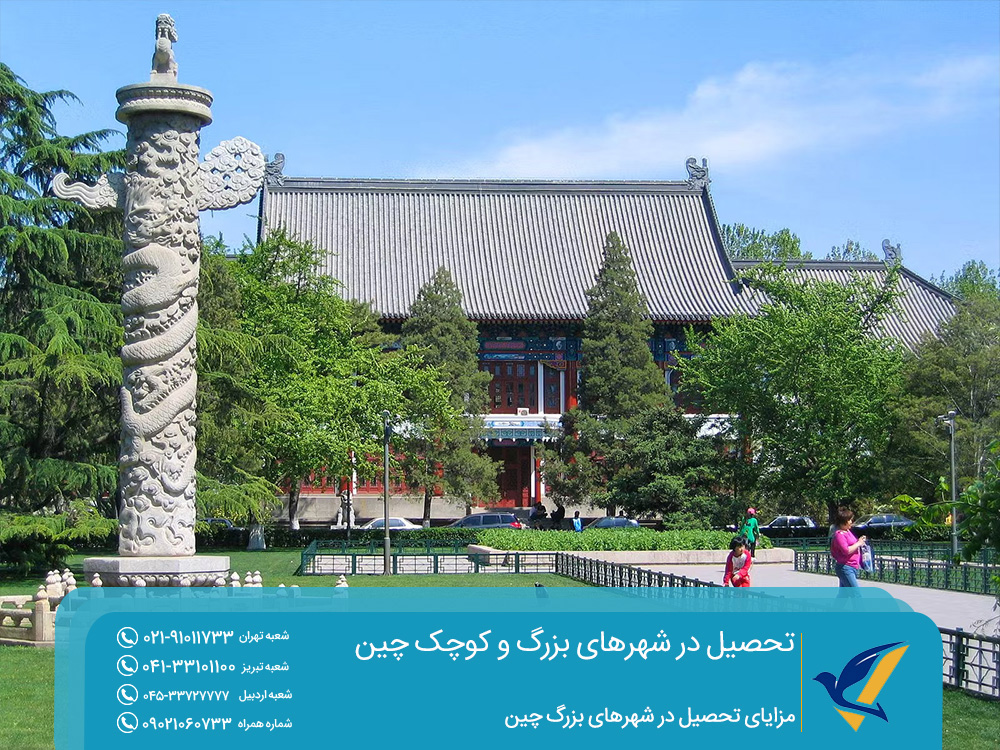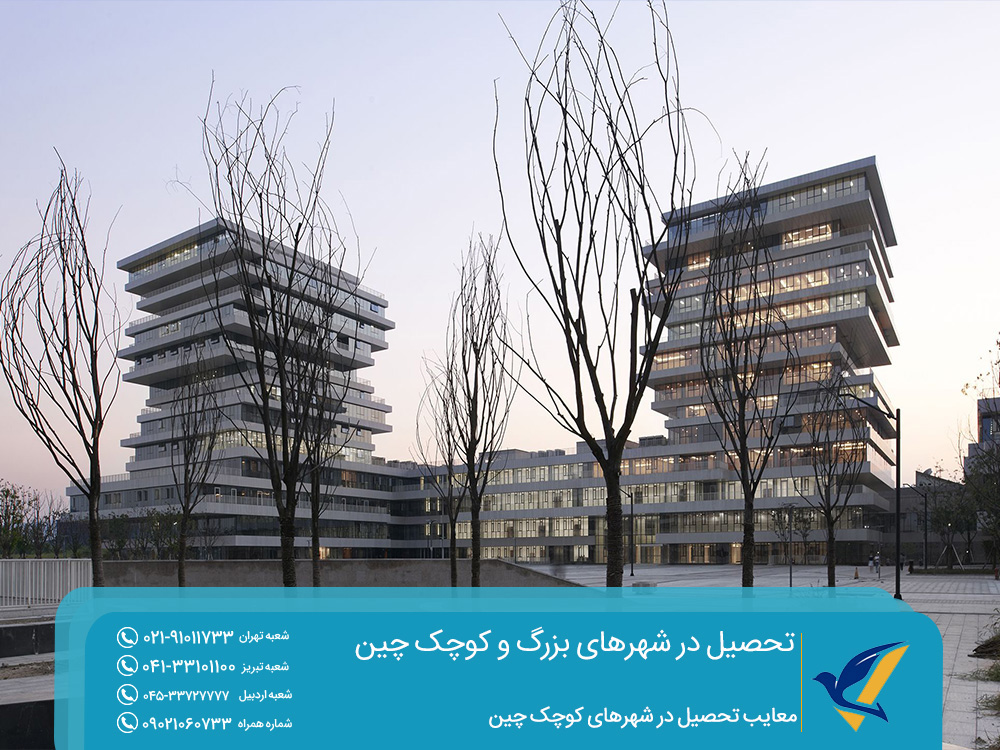Studying in Large and Small Cities in China: A Unique Experience
Studying in large and small cities in China offers an entirely different experience for international students, with significant impacts on their academic and professional journeys. While studying in China in both large and small cities has its unique characteristics, the choice between the two can have a notable effect on students’ career opportunities and quality of life.
Advantages of Studying in Large Cities in China
Large cities like Beijing, Shanghai, and Guangzhou offer advanced educational facilities, renowned universities, and a larger number of job opportunities, which can be appealing to many international students. These cities are home to prestigious global institutions, giving students the chance to study in a dynamic and competitive environment.
However, living in large cities often comes with higher living costs and challenges like crowded spaces and air pollution. Despite these challenges, the abundance of cultural diversity and increased opportunities for employment after graduation make studying in these cities attractive to many students.
Studying in Small Cities in China
On the other hand, studying in smaller cities in China provides its own set of advantages. These cities tend to offer a calmer atmosphere for studying and have much lower living costs compared to the major metropolitan areas. Although job opportunities may be more limited, students can enjoy a closer relationship with professors and classmates and a more personalized educational experience.
While smaller cities may lack the sheer number of opportunities for networking and employment found in larger cities, the peaceful environment may allow students to concentrate more effectively on their studies.
Conclusion
Ultimately, the choice between studying in large or small cities in China comes down to individual preferences and goals. Studying in large cities such as Beijing and Shanghai offers better opportunities in terms of education, networking, and career prospects post-graduation. On the other hand, studying in smaller cities offers a quieter, more cost-effective environment, which may be ideal for students looking to focus solely on their studies in a more intimate setting.
- At Elm Vira Immigration Institute, we provide expert guidance on the best academic paths and immigration routes. For more details, visit Elm Vira to complete the consultation form.

Advantages of Studying in Large Cities in China
Studying in both large and small cities in China offers numerous opportunities for students based on various factors. In large cities, educational and job opportunities are much more extensive compared to smaller cities. One of the major advantages is the access to world-renowned universities located in these cities. Universities such as Peking University, Fudan University in Shanghai, and Tsinghua University are considered some of the best in China and the world. These institutions offer high-quality academic programs, distinguished professors, and advanced facilities for students.
In large cities, there are also research and academic opportunities with ample financial support and facilities available for students. Moreover, studying in these cities provides many job opportunities alongside the universities. Given the presence of numerous international companies, startups, and diverse industries in these cities, students have easy access to the job market and can find various internships and employment opportunities.
Another key advantage of studying in large cities in China is the cultural and social diversity. Cities like Beijing and Shanghai host international students from all over the world, which creates a rich environment for exchanging ideas, learning about different cultures, and practicing multiple languages. This international atmosphere allows students to grow not only academically but also socially and culturally.
Furthermore, studying in large cities in China offers a comfortable living experience due to easy access to public transportation, shopping centers, recreational areas, and advanced amenities. The public transportation systems in these cities are highly developed, making commuting convenient for students. Additionally, the healthcare services in these cities are of a high standard, enabling students to easily access medical and health services.

Disadvantages of Studying in Large Cities in China
While studying in large cities in China offers numerous advantages, these cities also come with specific challenges that graduates must confront. One of the most significant challenges is the high cost of living. Cities such as Beijing, Shanghai, and Guangzhou have high living costs due to their large populations and advanced economies. Rent, transportation, food, and other living expenses in these cities can be heavy for students, especially those without scholarships or financial support.
Another downside of studying in large cities in China is the congestion and air pollution. Due to the high population and extensive industrial activities, large cities in China face issues like heavy traffic and air pollution. This not only impacts the quality of life in these cities but also affects the physical and mental health of students. Living in such environments may lead to stress and anxiety for many students.
Additionally, due to the presence of prestigious universities and the large population, students face intense competition for acceptance into specific programs or finding job opportunities. This competition can place added pressure on individuals and, in some cases, limit opportunities for personal and professional growth.
Moreover, in these cities, the high cultural and social diversity may pose cultural adjustment problems for some international students. While the diverse environment offers many learning opportunities, students coming from smaller countries or different cultures may feel isolated or detached from the urban community. This can be especially challenging for those who are new to China and have not yet mastered the Chinese language.

Advantages of Studying in Small Cities in China
Studying in small cities in China offers distinct advantages, particularly in terms of job opportunities, costs, and competition levels. Compared to large cities like Beijing and Shanghai, small cities tend to focus more on quality of life and lower costs. The costs of housing, transportation, food, and other daily needs in small cities are significantly lower. This makes them an attractive option for international students seeking more affordable study conditions in China. In these cities, the relatively low cost of living, coupled with adequate amenities, makes student life more financially manageable.
One of the greatest advantages of studying in small cities is the quieter and less competitive environment. These cities generally have smaller populations, and the hustle and bustle of large urban areas is much less prevalent. This creates a setting where students can focus more on their studies and research. The academic competition in small cities is also less intense compared to larger cities, which can be particularly beneficial for students looking for a less stressful academic experience. Additionally, due to the smaller population, there are more opportunities for students to establish closer relationships with professors and academic advisors.
Moreover, studying in small cities offers students the chance to immerse themselves in a rich cultural experience. Living in a smaller, less internationalized city provides more opportunities to experience authentic Chinese culture and traditions. In these environments, students can improve their Chinese language skills and engage more with local customs and practices in daily life. This cultural experience can be especially valuable for those seeking an authentic life experience in China.

Disadvantages of Studying in Small Cities in China
Studying in small cities in China can come with significant limitations, especially regarding access to global job opportunities. This can hurt the professional lives of graduates. One of the main issues is that the educational facilities in these cities are often not as advanced as those in larger cities. While many of China’s prestigious universities are located in major urban areas, smaller cities may offer fewer educational resources. This could mean limited access to distinguished professors, advanced research facilities, and specialized workshops.
Students may not be able to benefit from the educational conditions in China to the same extent as they could in larger cities. Additionally, one of the disadvantages of studying in small cities in China is the limited job and internship opportunities. Students studying in these cities may find it more difficult to secure high-paying jobs and internships in their specialized fields. Since most international students are concentrated in larger cities, networking, and professional connections may also be more restricted.
In comparison between studying in large and small cities in China, another disadvantage of studying in small cities is the lack of cultural diversity and international opportunities. Large cities tend to have higher ethnic and cultural diversity, offering students the experience of living in an international environment. However, in smaller cities, this diversity may be less prevalent, and students may have fewer opportunities to interact with different cultures. This can lead to limited opportunities for cultural exchange and expanding social networks.
Furthermore, another disadvantage of studying in small cities in China is the lack of recreational and entertainment facilities that are typically available in larger cities. Small cities generally do not offer the same range of amenities, such as large shopping centers, international restaurants, cinemas, and diverse entertainment options.

Educational System in Large and Small Cities in China
The educational system in China varies significantly between large and small cities, affecting the learning experience for students. The quality, structure, and available resources differ, influencing how students experience their education.
- Educational System in Large Cities in China
In large cities like Beijing, Shanghai, and Guangzhou, the educational system is typically more internationally advanced and offers a wealth of resources and opportunities for research and learning. These cities host some of China’s most prestigious universities, many of which are recognized globally in rankings. These universities attract international students, top professors, and specialized researchers, providing advanced research facilities and scientific resources.
In these cities, students have access to high-quality educational materials, state-of-the-art laboratories, advanced workshops, and up-to-date academic programs. Furthermore, these cities often feature major research centers and collaborations with renowned universities worldwide, offering students numerous research opportunities. Therefore, for students interested in research and specific academic fields, studying in large cities can be highly beneficial.
However, these resources come at a higher cost. Studying in large cities in China is generally more expensive than in smaller cities, with higher living costs, including accommodation, transportation, and tuition. Furthermore, given the large number of students and intense competition, it may be harder for students to establish close connections with professors and academic advisors.

- Studying in Large vs. Small Cities in China: Educational System in Small Cities
In contrast, the educational system in small cities in China tends to be more local and operates with fewer resources. These cities typically host smaller universities with lower rankings compared to those in large cities. These universities may lack advanced research facilities and generally focus more on practical education and large lecture-based classes. This means that students in small cities may not have access to the sophisticated resources and research opportunities that large cities provide.
However, studying in small cities in China can be ideal for those seeking a quieter and less competitive academic environment. Interactions between professors and students are typically more frequent, allowing students to benefit from personalized mentoring. On the other hand, the educational experience in small cities may come with challenges, such as limited job opportunities and internships. Many international companies and high-profile job opportunities are concentrated in larger cities, meaning students in smaller cities may struggle to access these prospects.
- Differences in Teaching Methods and Curricula
When comparing the educational experience in large and small cities in China, curricula in large cities are typically designed around modern teaching and research methods, aligning widely with international standards. This is particularly noticeable in specialized fields and advanced degrees such as master’s and PhD programs. In these cities, the use of educational technologies and modern teaching approaches is more common. In contrast, universities in smaller cities may follow more traditional teaching methods, and some of these institutions may have fewer resources for creating advanced educational experiences.

- Access to International Opportunities and Networking
Studying in large cities in China offers numerous opportunities for students to build international connections and networks. Due to the presence of international students and numerous partnerships with universities outside China, students can benefit from diverse experiences and cultures. In contrast, in smaller cities, similar opportunities for international interactions may be more limited.
Impact of Studying in Different Cities in China on Post-Graduation Career
Studying in large and small cities in China can have vastly different impacts on the careers of graduates. These differences are influenced by whether students study in a large or small city. Here, we explore the impact of studying in these two types of cities on career prospects.
- Impact of Studying in Large Cities in China
Studying in large cities in China, especially due to the abundance of job opportunities, stronger networking prospects, and the presence of international companies, can have a significant positive impact on a graduate’s career. In these cities, large companies and industries typically seek to hire graduates from prestigious universities. Therefore, choosing the right university in China is crucial. These universities are usually more competitive and are equipped with advanced educational resources.
- Graduates from large cities benefit from advantages such as access to international job opportunities, exposure to global companies, and exposure to diverse expertise. However, in these cities, the competition for jobs is intense, as many professionals are also competing. As a result, graduates must possess specific skills and unique capabilities to stand out from the competition.

- Impact of Studying in Small Cities in China
On the other hand, studying in smaller cities in China can affect graduates’ careers differently. While job opportunities may be fewer, the career trajectory after graduation may be more straightforward due to less competition. This is especially true for those looking to start their businesses. Studying in smaller cities can offer them the chance to identify local needs and launch entrepreneurial ventures. Given the smaller populations and less developed needs in these areas, graduates may enter the job market more quickly and even find greater opportunities in managerial and leadership roles.
Additionally, the lower cost of living in smaller cities enables graduates to start in jobs with lower pay but with a more comfortable lifestyle and less financial pressure. However, it is important to note that studying in smaller cities might mean that graduates are less likely to grow at a global level due to a lack of diverse international job opportunities, limiting their access to global career prospects.
Summary
Ultimately, studying in large or small cities in China is heavily influenced by the choice of location. Studying in large cities is typically more competitive, but the benefits of studying in larger cities include greater job opportunities, superior educational facilities, and stronger networking potential, all of which can contribute to graduates’ professional advancement. On the other hand, small cities might offer lower costs and less competition, but may also provide fewer global job opportunities. In general, the decision between these two options depends on each student’s career goals, budget, and personal preferences.
- Elm Vira is a reputable educational migration institution that helps prospective students select their desired universities for further studies, offering free expert consultation and full support to simplify the complex process of educational migration.
میانگین امتیازات ۵ از ۵
از مجموع ۲ رای